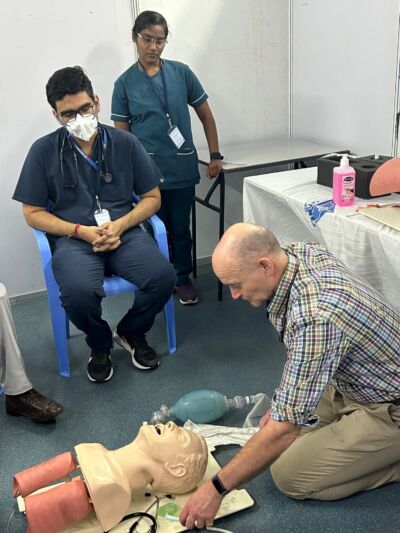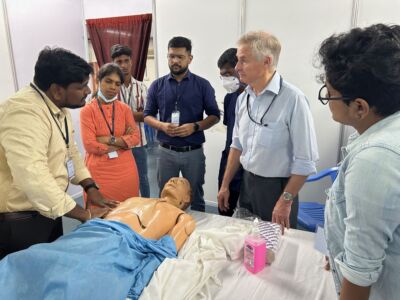Date: 19 – 23 April 2023.
Venue: Sri Ramachandra Institute of Higher Education & Research, Chennai
Dr David Bruce OBE MSc MBBS FIMC RCSEd FFOM DAvMed DMCC AKC
Chair of Training and Standards Cttee and International Development Lead FPHC RCSEd
Following on from the joint Faculty of Pre-hospital Care (FPHC)/Faculty of Disaster Medicine -India and Nepal (FDMIN) Workshop held in Chennai in October 2023, two inaugural Pre-Hospital Trauma Care (PHTC) Provider Courses delivered at the Sri Ramachandra Institute of Higher Education and Research (SRIHER) in Chennai on 19 – 20 April and 22 – 23 April 2023. Funding was provided by the UK-registered charity Saving Lives. FDMIN aims to improve training in all phases of disaster response(1) and sees pre-hospital care (PHC) as having a key role in the initial responses as well as contributing to reducing the wider, ongoing accident-related health burden in South Asia.
 India recorded just over 397,500 accidental deaths in 2021(2) of which 1.8% were due to forces of nature such as flooding or earthquakes while 98.2% were due to other causes defined as ‘deliberate or negligent conduct of human beings’ including falls, factory incidents, explosions, crowd stampedes, building collapses, road traffic and other incidents. These death-related figures also indirectly indicate the significant burden of morbidity due to accidents with the consequent significant personal, emotional and economic impact on the population.
India recorded just over 397,500 accidental deaths in 2021(2) of which 1.8% were due to forces of nature such as flooding or earthquakes while 98.2% were due to other causes defined as ‘deliberate or negligent conduct of human beings’ including falls, factory incidents, explosions, crowd stampedes, building collapses, road traffic and other incidents. These death-related figures also indirectly indicate the significant burden of morbidity due to accidents with the consequent significant personal, emotional and economic impact on the population.
The PHTC Course is an established FPHC-endorsed course aimed at multi-disciplinary candidates who work for any of the emergency services, is a member of the armed forces or is a health care professional who treats the seriously injured during the pre-hospital phase of care. The course is a 2-day programme aimed at providing candidates with the skills and knowledge to recognise the seriously injured patient, including mass casualties, and to provide appropriate interventions to manage patients in the pre-hospital environment, within their scope of professional practice.
The UK version of the PHTC Course was edited to take account of the current PHC capabilities and practice in India guided by information from the October 2023 Workshop and input from local practitioners. In addition, a folder of supporting administrative documentation was developed to allow the planned dissemination of the course to other approved training centres and maintain consistency of training. The FPHC Foundation Material for Immediate Care Manual, in an e-format, was used as the reference text. The UK faculty comprised myself, Dr Lorraine Greasley and Dr Rob Russell and we were fortunate enough to be joined by Professor Ramakrishnan who is the Head of the Emergency Medicine Department at SRIHER and a key influencer in the development of PHC in India. Professor Ramakrishnan engaged with his PHC contacts, some of whom had attended the October 2023 Workshop, to ensure that we had a multi-disciplinary group of candidates from different locations across India. Dr Peter Patel of FDMIN invited candidates from Nepal. Ultimately, we had 41 candidates comprising 12 paramedics and 29 doctors from a range of backgrounds and including 4 from Nepal.
The course focused on the ABCDE paradigm of pre-hospital care and used a combination of presentations, skills stations, discussions and casualty simulations for training. In addition, informal discussions about UK PHC developments and capabilities took place outside the formal timetable; some capabilities that do not currently exist within Indian PHC were introduced to stimulate discussion and potentially nudge progress. However, such proposed developments needed to be sensitive to the scale of the task and costs in India/Nepal allied with the fact that structured pre-hospital care is at an early stage compared with the UK and healthcare systems are not unified.
 The courses were very successful, and all candidates passed the final summative moulage. An MCQ paper was also part of the course, and this proved to be more challenging; moreover, the results did not necessarily correlate with candidates’ performance throughout the wider course or during the final assessed moulage. Candidates from the first course who were unsuccessful in their MCQ exam were able to sit a different MCQ exam on 21 April when they were attending a linked FDMIN Disaster Medicine Course and candidates from the second course have also been offered a further opportunity to re-sit.
The courses were very successful, and all candidates passed the final summative moulage. An MCQ paper was also part of the course, and this proved to be more challenging; moreover, the results did not necessarily correlate with candidates’ performance throughout the wider course or during the final assessed moulage. Candidates from the first course who were unsuccessful in their MCQ exam were able to sit a different MCQ exam on 21 April when they were attending a linked FDMIN Disaster Medicine Course and candidates from the second course have also been offered a further opportunity to re-sit.
The suitability of an MCQ exam as a key form of final assessment in an overseas course where several candidates were focusing on practical skills, and may have difficulties with language, was discussed with candidates and within the faculty. Interestingly, and coincidentally, the role of MCQ examinations in PHC short courses was already being debated within the FPHC Training and Standards Committee having been raised by a UK training provider who had highlighted that their candidates were practical learners and in whom they found that MCQ results did not necessarily correlate with wider course performance. For overseas PHC courses, it may be that documented continuous assessment and a final summative moulage with clearly defined success outcomes will be a better model. The acceptability of this needs to be debated more widely and take account of expectations in India.
Feedback was received from all candidates and was excellent; the faculty were invited to deliver the course at other locations in India. However, in order to establish a firm foundation and local ‘ownership’ the ultimate aim is for the course to be delivered by selected India faculty at approved centres. Accordingly, candidates with Instructor Potential were selected across the two courses; we felt these individuals demonstrated the knowledge, practical skills, experience and enthusiasm needed to be effective instructors. Over 35% of the candidates were felt to have the correct attributes and while this may seem high, compared with courses such at ATLS®, it is unsurprising since Professor Ramakrishnan had deliberately targeted PHC enthusiasts for the first courses. The next step, which is scheduled for October 23, is to hold an Instructor Course for the selected candidates led by UK faculty and then oversee/guide their delivery of a further 2-day Provider Course immediately afterwards. This will hopefully generate more candidates with Instructor Potential and generate an India-based group who can run courses at approved training centres using material and documentation from the FPHC within a memorandum of understanding. Quality assurance of courses will be carried out by periodic visits by a member of the FPHC and further depend upon careful selection of training centres that will be required to meet the established FPHC overseas course-endorsement criteria.
The unwavering support of Professor Ramakrishnan, Dr Peter Patel of the Saving Lives International charity, and all SRIHER staff but particularly the BSc/MSc Trauma Care Management students was fundamental to the success of the courses. In addition, I am grateful to Dr Uma Sekar(3) for allowing us the use of SRIHER.
The course was linked to an additional training day with focus on “Role of Pre-Hospital and Emergency Care in Disaster,” covering mass causalities in natural and man-made disasters, understanding disaster hazards, vulnerability and risks, injuries and health care impacts of disasters including challenges of mass gatherings in the region. Dr Peter Patel of FDMIN with support from the course team led this initiative.
Dr Pam Hardy, Chair of FPHC says: “This is a fantastic international development for FPHC and the culmination of a significant amount of work, aided by the support of RCSEd, to run the joint workshop alongside last year’s RCSEd International conference in Chennai. I am immensely grateful to Dr David Bruce and the faculty for all their work on this course and its inaugural delivery. The excellent feedback suggests this will be the first of many, extending the international reach of vital education and overseas relationships. My thanks to all at SRIHER, Professor Ramakrishnan and Dr Peter Patel for your much-valued collaboration.”
Notes:
(1) Mitigation, preparedness, response and recovery.
(2) Accidental Deaths and Suicides in India 2021 published by the National Crimes Record Bureau of the Ministry of Home Affairs.
(3) Vice Chancellor of SRIHER.
